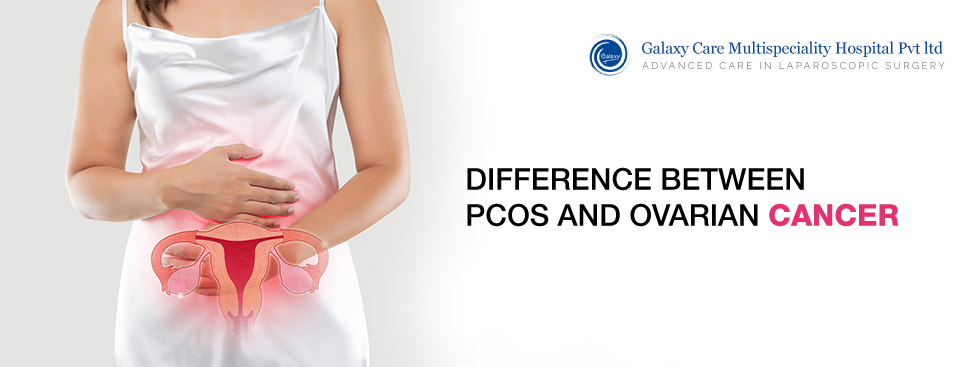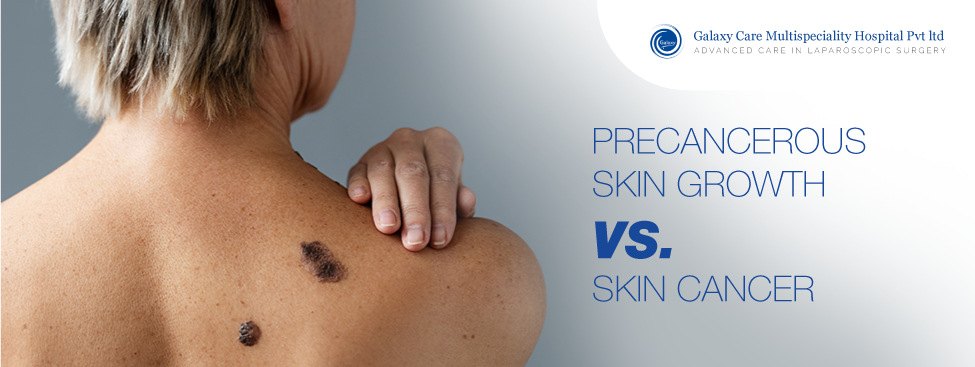
Understanding the Difference Between PCOS and Ovarian Cancer
You’d be surprised how often PCOS and ovarian cancer get mixed up. Both conditions affect the women’s reproductive system, but that’s where the similarities largely end. Understanding the differences is key to getting the right diagnosis and care.
Galaxy Care Hospital is one of the leading cancer hospitals in Pune. We diagnose and treat gynaecological cancers and other related conditions. Let us help you delve into the key differences between PCOS and ovarian cancer, shedding light on their risk factors, and potential implications for women’s health. Let’s begin.
What is Polycystic Ovarian Syndrome (PCOS)?
PCOS is a hormonal disorder that affects women of reproductive age. It is characterised by an imbalance of hormones, particularly an excess of androgens (male hormones) and insulin resistance. This hormonal imbalance can lead to a range of symptoms, including irregular menstrual cycles, excessive hair growth (hirsutism), acne, and difficulty conceiving. In PCOS, the ovaries may develop multiple small fluid-filled sacs called cysts, which can interfere with the normal ovulation process.
What is Ovarian Cancer?
Ovarian cancer, on the other hand, is a type of cancer that begins in the ovaries. The ovaries are responsible for producing eggs and the female hormones estrogen and progesterone. Ovarian cancer can develop in various types of cells within the ovaries, and it is often detected at an advanced stage due to its vague and non-specific symptoms. Unlike PCOS, ovarian cancer is not a hormonal disorder but rather a potentially life-threatening malignancy.
Key Differences Between PCOS and Ovarian Cancer
Causes and Risk Factors
PCOS is primarily caused by a hormonal imbalance, with genetic and environmental factors playing a role. The exact cause is not fully understood, but it is believed to involve a combination of insulin resistance, obesity, and an imbalance of hormones produced by the ovaries and other glands. On the other hand, ovarian cancer can develop due to various factors, including genetic mutations, age, reproductive history, and certain hormone-related conditions.
Symptoms
While PCOS and ovarian cancer both involve the ovaries, their symptoms can differ significantly. PCOS is typically characterized by irregular menstrual cycles, excessive hair growth, acne, and difficulty conceiving. Ovarian cancer, however, may initially present with vague symptoms such as bloating, pelvic pain, abdominal discomfort, and changes in bowel or bladder habits. In some cases, ovarian cancer may not cause any noticeable symptoms until it has advanced to a later stage.
Diagnosis
The diagnosis of PCOS and ovarian cancer involves different approaches. PCOS is diagnosed based on a combination of clinical symptoms, physical examination, blood tests (to check hormone levels), and ultrasound imaging to evaluate the appearance of the ovaries. Laparoscopic gynae surgery may also be recommended in some cases to confirm the diagnosis or rule out other conditions.
Ovarian cancer, on the other hand, is typically diagnosed through a combination of imaging tests (such as transvaginal ultrasound, CT scan, or MRI), blood tests (to check for elevated levels of certain tumor markers), and biopsy (a surgical procedure to remove a sample of ovarian tissue for examination). Laparoscopic gynae surgery may also be recommended as a course of treatment.
Treatment
The treatment approaches for PCOS and ovarian cancer differ significantly. PCOS is a chronic condition that is managed through lifestyle modifications (such as diet and exercise), medications (to regulate hormone levels and insulin resistance), and laparoscopic gynae surgery in some cases (to remove cysts or assist with fertility).
Ovarian cancer, on the other hand, is typically treated with a combination of surgery, chemotherapy, and radiation therapy, depending on the stage and type of cancer. The goal of treatment is to remove the cancerous tissue and prevent the spread of the disease.
Early Detection and Regular Check-ups
Both PCOS and ovarian cancer emphasize the importance of regular check-ups and early detection. Women with PCOS should monitor their symptoms and work closely with a gynaecologist + laparoscopic surgeon in Pune or their healthcare provider to manage the condition and reduce the risk of long-term complications.
For ovarian cancer, early detection can significantly improve treatment outcomes and potential survival rates. Women should be aware of the subtle signs and symptoms of ovarian cancer and promptly report any concerns to their healthcare provider. Regular pelvic exams and imaging tests may be recommended, especially for women with a family history or other risk factors for ovarian cancer.
The Bottom Line
In conclusion, while PCOS and ovarian cancer both involve the ovaries, they are distinct conditions with different causes, symptoms, and treatment approaches. Suppose you or a loved one is experiencing symptoms or has concerns about ovarian cancer. In that case, seeking medical attention from a reputable healthcare facility such as Galaxy Care Hospital in Pune is essential. Our hospital is renowned for its advanced expertise in ovarian cancer treatment, offering laparoscopic gynae surgery and other cutting-edge treatments performed by experienced gynaecologists + laparoscopic surgeons in Pune. Early detection and prompt treatment can significantly improve outcomes and provide the best possible care for women’s reproductive health. Feel free to book your appointment with us!


